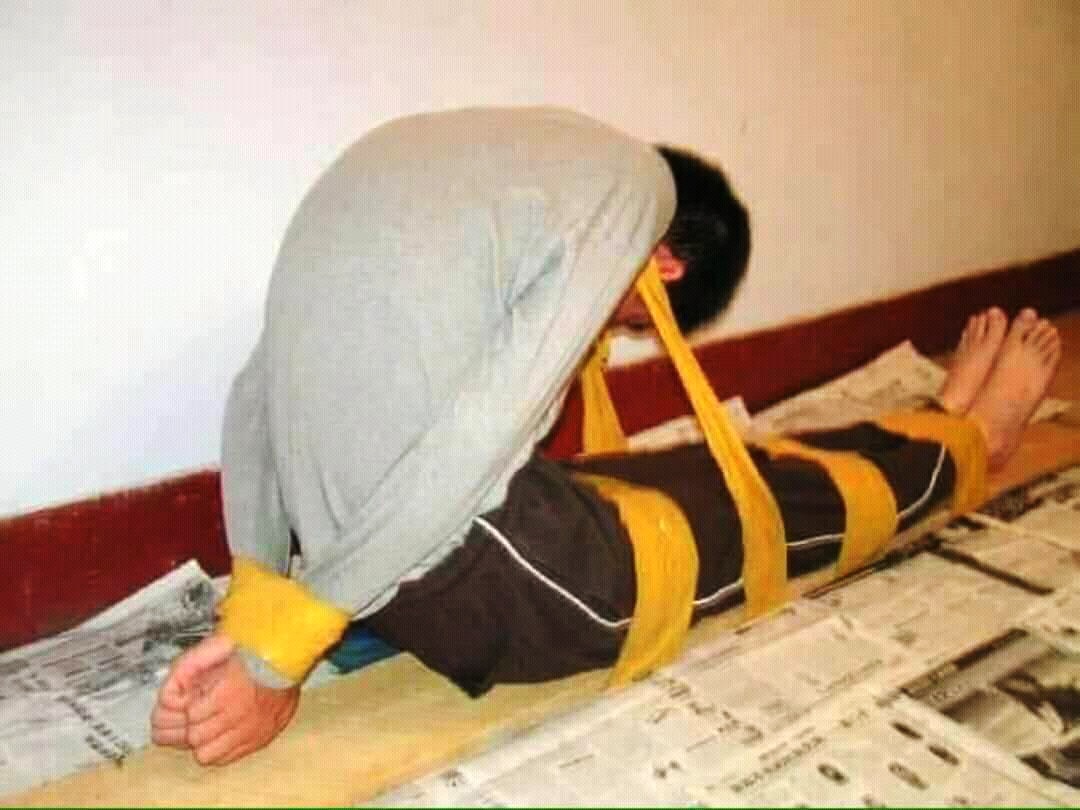
Since 2017, the Chinese government, on the orders of Communist Party General Secretary Xi Jinping, has created a state programme to imprison, torture, kill and recondition up to 3 million Muslims, of Turkish origin, who have been living in the Xinjiang Uyghur province for generations: the programme, comparable to Nazi extermination camps, is organised in political education camps, preventive detention and imprisonment[1], without trial, for years or forever. Uyghur Muslims are subjected to forced political indoctrination, religious and linguistic persecution[2]. Prisoners are subjected to bizarre ‘brainwashing’ exercises, as well as physical torture, rape, medical experimentation[3] and sleep deprivation[4]. They are also used as labour force, forced to work for free in factories (even those of famous brands)[5]. This is the largest detention of ethnic[6] and religious minorities since the end of World War II[7].
Uyghur Muslims live on the border with Kazakhstan, Kyrgyzstan and Mongolia[8], in an area under Chinese control since 1949[9], where Muslims make up about half of the indigenous population[10]. Once located along the ancient Silk trade route, Xinjiang (which translates as ‘New Frontier’[11]) is rich in oil and other natural resources such as cotton, wheat, corn and rice[12], and is a very important logistical hub in Beijing’s plans[13]. This is why the region attracts increasing numbers of Chinese, a migration encouraged by the government and which has inflamed ethnic tensions[14]. China considers sporadic acts of violence by individual Uyghurs as acts of an independence movement: Uyghur activists claim that years of oppression have fuelled popular anger[15]. In 2009, about 200 people died in clashes in Xinjiang, which the Chinese blamed on Muslims demanding their own state[16].
A recent investigation found evidence that Chinese authorities subjected Uyghur women to mass sterilisations, forcing them to take contraceptives or have abortions, and placing them in concentration camps – an act that falls under the UN definition of genocide[17]. A series of police files, obtained by the BBC in 2022, revealed the details of these camps, and contains thousands of mugshots of detainees, some detainees being less than 15 years old, and describes the habitual use of violence and murder[18]. Despite the fact that in 2019, 22 countries expressly asked China to release the Muslims, to let in independent UN experts and observers, and to close the camps[19], the situation remains unchanged.
To end up in one of the camps, it is enough to be caught by high-tech electronic surveillance (the IJOP app)[20] committing offences that warrant arrest: wearing a beard, having relations with relatives abroad, applying for a passport, praying, wearing a headscarf, having more than two children[21]. The government tries to justify its conduct as part of a counter-terrorism strategy[22], and calls the camps ‘vocational training and employment centres’ for ‘criminals involved in petty crimes’. However, they do not allow any independent monitoring of these facilities by the UN, human rights organisations or the media[23].
The Spanish online magazine Loopmedia (www.loopmedia.app) allowed us to publish an interview with one of the few Uyghurs who managed to escape from the camps, Professor Dolkun Isa, who managed to escape in 2017 with the help of some international NGO collaborators and now lives and works in Munich, Bavaria[24].
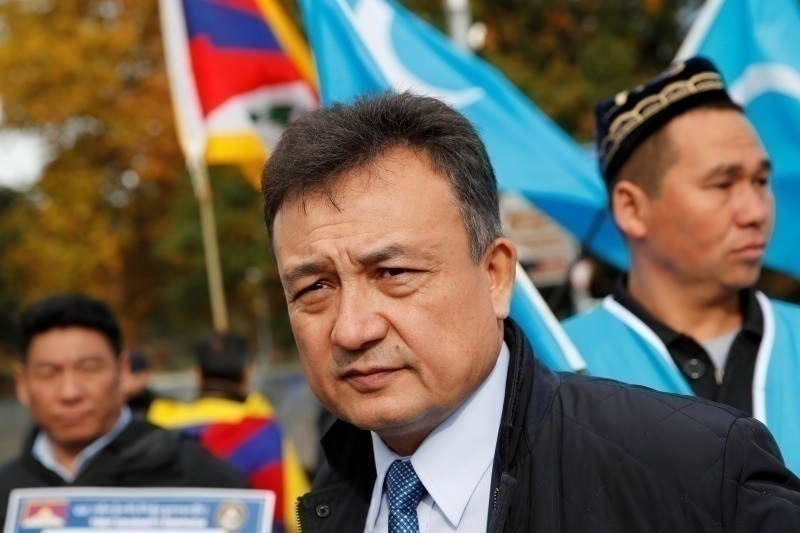
Professor Isa at a demonstration in favour of Uyghur rights[25]
QUESTION: Professor Isa, what do you remember about China when you were growing up? How did your youth unfold?
ANSWER: I was born in 1967, in Aksu, East Turkestan. When I was born, my land was already occupied by China and the People’s Liberation Army. I grew up in Aksu and in a small village called Kalpin, with my grandmother, as my parents were very busy with work and did not have much time to take care of the children. Thus, most of my siblings and I grew up with my grandparents. I went to primary, middle and high school there. Then, in 1984, I enrolled at Xinjiang University to study physics. This was the time when everything changed: before I enrolled in the university, I didn’t understand much about what China was about, but when I got to talk to my classmates, I learnt a lot. We discussed different topics and this opened my eyes.
In 1985, in my second year at university, there was the largest democratic student movement and I actively joined the protest. It was a turning point. At that time I thought: ‘Why? Why are we being discriminated against? Even at the level of education, there was a lot of discrimination at all levels, and if you read the Chinese Constitution, there is something called the autonomy law. Since the Xinjiang region is an autonomous region, there are many rights for Uyghurs. But the reality on the ground is different, there was no trace of this autonomy.
I thought: why do we have to demand this right for ourselves? Why is it not implemented? At that time I was not so aware, I thought this law had been implemented by China, but I did not realise that it was all a sham and only existed on paper. I said to myself: if a right has not been given to you voluntarily, then you must demand it. It was then that I faced my first challenge….
Almost 75-80% of Uyghurs are illiterate because there is no schooling in most rural areas. The level of education in society is very low, so they cannot claim their rights. Therefore, I thought it was necessary to educate people and make them aware of the rights they should have and the discrimination they are facing. This inequality does not come from God! I discussed this issue with other students at the university and in 1987 we founded a student club. It was called the Students’ Union for Science and Culture. We got permission.
It was quite difficult at the time. We mobilised many Kazakh and Uyghur students to go to rural areas to spread the alphabet and provide education. If people can learn the alphabet, then they can start to learn some things and understand what kind of rights they have. Besides, all media in China is a propaganda tool of the Communist Party, and a little education could create critical thinking. We started our activities during the summer and winter holidays. Unlike Europe or other parts of the world, there are no private companies, no opportunities for students to work and earn money. During those months the students are inactive. There is no social life. That was the reason we were able to mobilise the students: they were happy to do something. They were volunteers, of course, because we could not pay them.
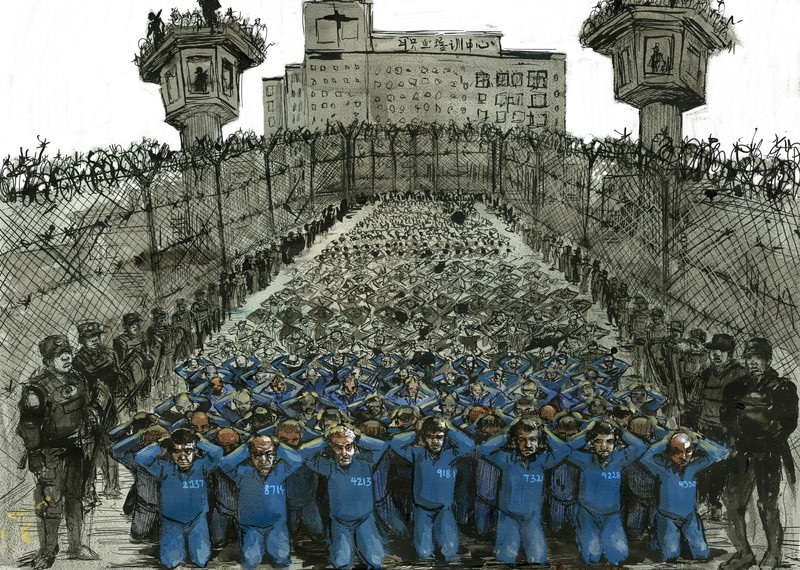
A drawing of a 13-year-old girl who escaped the camps and is now hiding in Saudi Arabia[26]
At that time, UNESCO was working with the Chinese government to increase education in China. So, I thought my activism should be supported by the government. But when we faced barriers, I realised that this policy is only for the Han Chinese, not for us Uyghurs or other ethnic minorities. The Chinese government does not really want to raise the educational level of Uyghurs and other ethnic groups, and the other aspects such as autonomy rights, autonomy laws and constitutional rights are only on paper. The rule of the Chinese Communist Party is superior to constitutional law. On 5 July 1988, I led a student demonstration.
We had more than five hours of debate with the Communist Party leadership and other student leaders. We decided to set up large camps and prepared throughout the night what we would plan for the following days. The next morning, the president of Xinjiang University and some other officials came to my room and said, “The party leadership wants to talk to you. We managed to talk to the Minister of Education, Finance and the Party Secretary. We discussed for more than five to six hours, but there was no compromise. So we decided to react and organise a protest. But before we could do so, in the middle of the night I was arrested for about four months. After that I was expelled from university. I could not graduate.
QUESTION: Why does the Chinese government persecute the Uighurs? We know the relationship China has with religion. Do they feel that faith in Islam may undermine their loyalty to communism and the communist regime?
ANSWER: The Chinese government does not accept diversity and multiculturalism. There are 56 minorities in China. But in reality, except for the Uighurs and Tibetans, the others are already assimilated. The government is trying to assimilate us, but the Uyghurs and Tibetans are resisting. The population of the Uyghurs is about 12.5 million, and that is still a lot of people, spread over 1.8 million square kilometres. Since the occupation, the Chinese government’s policy of discrimination and assimilation has never changed. But it has not succeeded, because we have struggled to keep our identity alive.
Sometimes, China uses very violent methods to repress: torture, arrests or killings. During the Chinese Cultural Revolution of 1966-1977, publications in the Uyghur language were banned, as were those in Tibetan. Sometimes they use soft tactics: after Mao Zedong’s death, the Chinese government tried to show the world that it was reforming its economy, making it liberal. We have seen some signs of autonomy. However, the Chinese policy of discrimination and assimilation has never changed. In 1949, when China occupied East Turkestan, the Chinese population was only 4-5%. It was mainly military personnel and their families. Over 80% were Uyghurs and another 10-15% were Kazakhs, Mongols and others. In the following years, the Uyghur population dropped to about 40%, while the Chinese population increased by 40%.
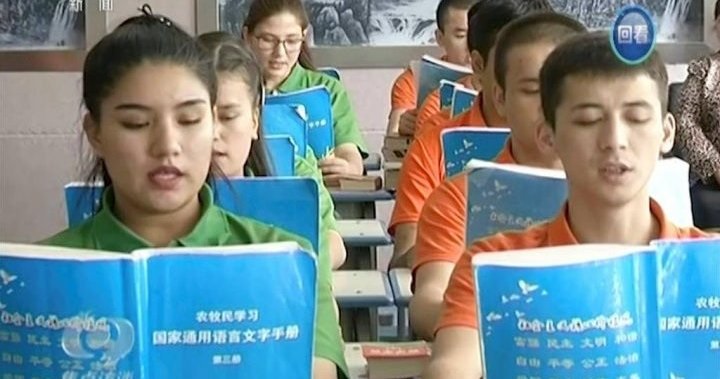
Uyghur children are forced to learn Chinese and are forbidden to speak their mother tongue[27]
The main goal of the Chinese government is to shift the population. China’s family planning policy also played an important role. Of course, it was for the whole of China and not just the Xinjiang region, but with the one-child or two-child policy, the actual decrease in the Uyghur population was realised. In 1985 and 1988, this was the main slogan of our demonstrations: ‘Stop the family planning policy’. Of course, there were also other demands, such as democratic elections and an end to nuclear testing in East Turkestan. The Chinese government conducted 46 nuclear tests from 1964 to 1996. Radioactive water pollution killed almost 1,000 people, who lived only 100 km from the test sites.
According to studies conducted by a Japanese professor, almost 1 million people died from radioactive poisoning. In conclusion, the Chinese government will never accept another culture, another identity, its main aim is assimilation. They don’t need Tibetans or Uighurs, only territory. The East Turkestan area has abundant natural resources. Gold, uranium, gas and coal. Even in Mongolia, despite being an autonomous region, just like Xinjiang, the Mongolian population is only 13%, while more than 85% of the population is Chinese. Most of the younger generation does not even speak Mongolian, only Chinese.
Recently, the Chinese government has turned its policy of discrimination and assimilation into a policy of genocide. Why now, so suddenly? It is not sudden at all: but when Xi Jinping took power, he chose genocide. This is mainly due to the One Belt One Road initiative. It is one of China’s biggest projects. It is a territorial expansion project. China is using its economic power to expand. Today, in the 21st century, you cannot occupy a piece of land by military force. If you occupy it by force, it will only be for a certain period of time, because international pressure will force it to retreat.
But if you dominate it economically, you can do it. Since China depends on energy from the Middle East, it wants to sell its cheapest, unskilled production to the world. That is why China has spent 64 billion dollars on the CPEC (China Pakistan Economic Corridor). This is a secret project. China thinks that as long as the Uighurs exist, it will never be able to realise this project. That is why Xi Jinping started it. He thinks that if we were eradicated, the problem would be solved. Only then would China be able to successfully implement the One Belt One Road project. That is why Xi Jinping, step by step, has implemented the policy of genocide.
QUESTION: What should be done to force China to face up to its responsibilities?
ANSWER: The Chinese government is not only persecuting the Uighurs. It is also persecuting Tibetans. The rest of the minorities have already been assimilated. But the Communist Party’s persecution also affects its own citizens. For example, Chinese Christians are persecuted by the CCP because the Party does not tolerate religion. Falun Gong also suffer. More than 80 million Falun Gong are suffering, they are Chinese but they are a religious group. Millions of Chinese Christians are also threatened, some churches have been destroyed. Buddhist temples have also been destroyed. Many Chinese human rights activists are now in prison. Liu Xiaobo, Nobel Peace Prize winner, died in prison. He was promoting women’s rights. This is why the issue is not only about the Uighurs and China.
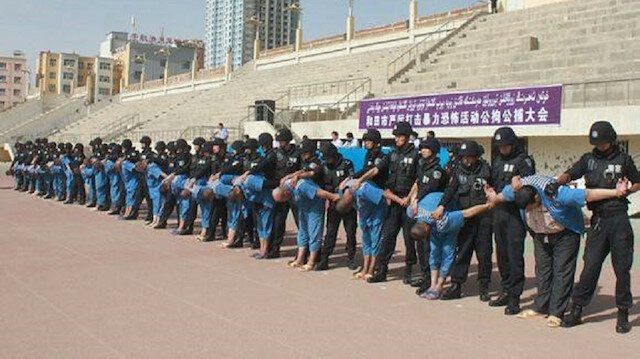
Humiliation rites of the Uighurs in Chinese detention camps[28]
China has a huge internal problem. China uses money, military power and police power. It pays them to try to control the whole of China, but for how long? We don’t know how long it can last. This crime must be subject to international law. If China provides food and clothing to 1.5 million people, it is not above the law. People know that it is not just the food that counts. If only stomachs are filled, life has no value. That is why China is facing many problems. After Xi Jinping came to power, he also changed the constitution. Before, there were only two terms. Now, just like Mao Zedong, it is open-ended.
That is why the Chinese Politburo has many problems. Some other Politburo members who are in prison have lost hope. That is why it is necessary to follow the international course of action. So far nine or ten parliaments have recognised the genocide against the Uighurs. And there will also be trials in the courts. Geoffery Nice, the former chief prosecutor of the trial of Slobodan Milosevic in The Hague, set up a tribunal and collected information for 18 months. More than 500 people testified and the hearing took place in London. They also invited the Chinese government, but it did not attend. On 9 December last year, the Uyghur court issued a ruling that the Chinese government had committed genocide and crimes against humanity. On 9 June, the European Parliament also recognised the genocide motion. We must push the countries. All countries that have signed the 1948 International Convention on Genocide have a legal duty and obligation to stop the ongoing genocide. And all human beings also have a moral obligation. This will put China with its back to the wall.
QUESTION: China is a big economy. When does morality trump money? There are many conferences and talks, but when it comes down to it, everyone is economically in bed with China. What do you think about money?
ANSWER: It is the same problem. This is true for some countries and companies where the value of life is less important than money. That is why today even many European countries and democratic societies turn a blind eye and ignore the genocide taking place. However, at first we saw some positive steps, because this genocide came to the fore two or three years ago, then more evidence was published and some leaked documents gave us testimonies of some survivors. Some countries, particularly democratic ones, cannot continue to remain silent. There is no excuse to keep silent, and if a country does, it is because of China’s economic power.
Remember that China is the second largest economy on the planet. The difference between China, which is an authoritarian country, and a democratic country is respect for fundamental human rights, democracy, the rule of law and transparency. If a country continues to keep quiet just for the money, then there is no difference between China and that country. The whole world has clearly seen the effects of the Crimean War and the current war between Russia and Ukraine. In the 21st century, people would never have thought that Putin would start such a war. And Putin is receiving strong support from China. You have to choose sides and act accordingly. But people are waking up, even if a little too late.
For example, in December last year, the US Congress passed the Uyghur Forced Labour Prevention Act. This means that the US and its companies cannot import anything produced from East Turkestan, or Xinjiang. This is a positive step. Some countries, such as the UK or Germany, are also discussing such a law. They are realising that for many years they tolerated the situation because of the temporary economic benefits, but now China is not only threatening the Uyghur community. It is also persecuting Tibetans and other Chinese. Today the whole world is slowly realising that China and the Russians are not only threatening regional peace, but also global peace and basic democratic values.
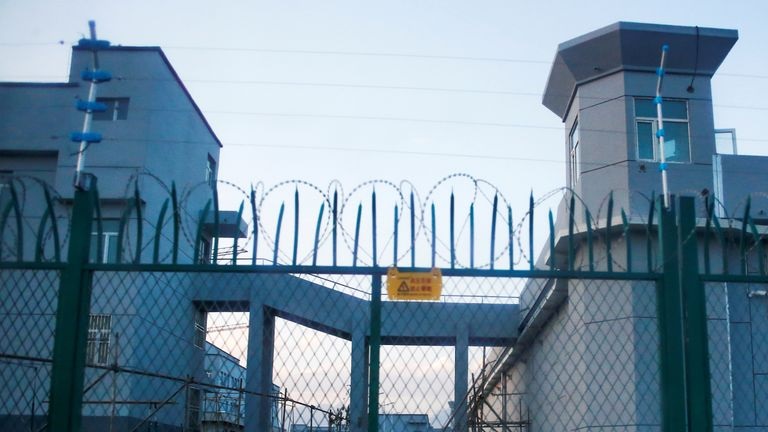
The entrance to the Dabancheng cultural re-education camp[29]
That is why we have seen a little more movement, a little late, but still necessary. If we wait and keep quiet, in 20 years China will be the largest economy in the world. What kind of world are we leaving to future generations? This is the important point, because we are trying to warn them, to educate them, and now people are slowly becoming aware that China is a threat to them. We have seen Europe and the US working together and taking positive measures against Russia. They immediately sanctioned Russia even though they need Russian energy. Similarly, sanctions against the Chinese government must also be considered.
QUESTION: Talking about these positive steps also brings me back to May 2022, when Michelle Bachelet, UN High Commissioner for Human Rights, visited the Xinjiang region. There was a lot of criticism because it was said that Bachelet was only repeating the words of the Chinese Communist Party. I would like to know her reaction to the visit.
ANSWER: We at the World Uyghur Congress have repeatedly called for an impartial visit to East Turkestan since 2019. China, at the time, denied everything. Eventually the Chinese government allowed her to visit, but she visited the Chinese Embassy first. The Chinese said it was just a friendly diplomatic visit. But she is not a diplomat, she is the representative of the highest human rights body. She is no longer the President of Chile. She is the UN’s highest human rights body. In theory, she represents the improvement of human rights. Before her visit, we mobilised Tibetans and Uyghurs demanding that her visit be a free one. But he did not meet any Uyghur representatives or camps.
His office had already finalised the Uyghur human rights report in September 2021. We expected the report to be published in September or October last year, but they kept putting it off. So we know his visit was pointless. He only met with some high-level Chinese officials and held a press conference and, well, it was shameful. He missed a historic opportunity to stop this atrocity. Many countries and almost every human rights organisation in the world criticised her visit. She only helped the Chinese government.
Last week, before I arrived in the US, I was in Geneva to attend the 50th session of the Human Rights Council and she was there. She said: “I was there, but I could not meet any detainees. I could not meet them because Chinese officials were always following me”. Why didn’t she say anything earlier? In the press conference she changed the tables because of the pressure. He also announced that he would run again, but he lost credibility. His own and that of the UN.
QUESTION: Michelle Bachelet’s visit took place only a few weeks before the action of some hackers who purloined police files. Did it help? Did it provide new information?
ANSWER: The document is useful to convince the international community. But it is not new to us. We are not surprised, unfortunately, because this evidence represents perhaps 1% of what is happening. One example: over the past six years, I lost contact with my family and received heartbreaking news. I lost my mother in one of the concentration camps. The last telephone communication with my mother was in April 2017. After about 14 months, I received the news that she had died. Many international media asked me: ‘In what condition did your mother die?’ I don’t know, I have no idea.
Then, two or three weeks later, the Washington Post did some research, randomly calling the police authorities or some government officials. They confirmed that my mother died in a concentration camp. In 2020, China’s Global Times reported that my father also died. Under what circumstances? I don’t know. Could he have died in hospital, at home or anywhere Where is his grave? I don’t know. And last year, in 2021, I received another heartbreaking news. My younger brother was sentenced to life imprisonment. Before that, I heard that my older brother, a maths teacher, was sentenced to 24 years in prison. This is all the news I have received in the last five years about my family.
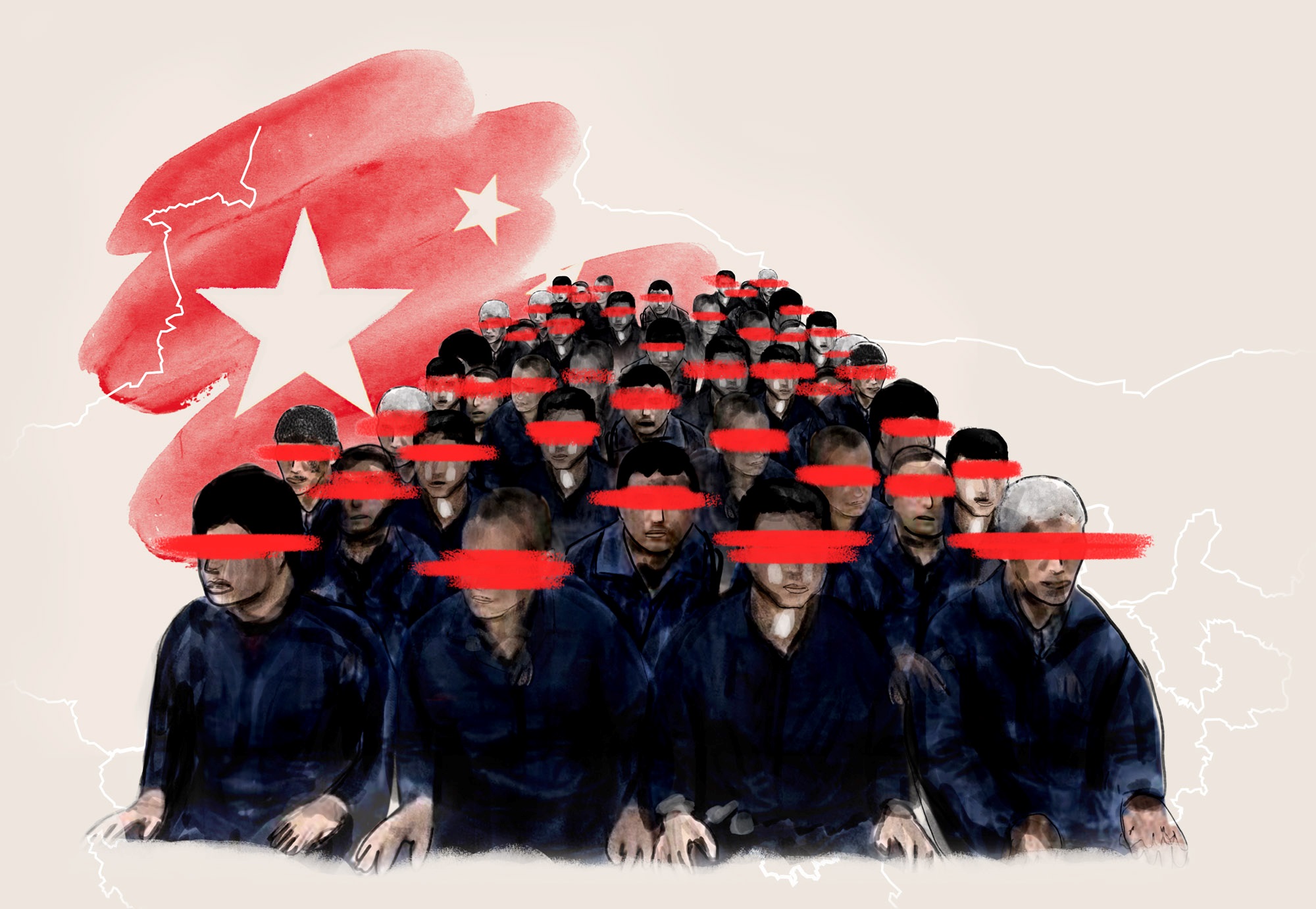
I don’t know if my two brothers are alive or dead. I don’t know how many of my relatives are still alive or how many are in concentration camps. I simply do not know. But my case is not unique. Most Uighurs living in exile have the same problems. That’s why these leaked files are nothing new for us. It is the situation we are confronted with every day. But it is very significant to convince the world. There are more than 5000 pictures and this is a shock to the world. The media has to do something. For the past two years we have been trying to convince the European Parliament to recognise the Uighur genocide. All right, some Members of Parliament might not give us their support before, but after the publication of this dossier and the session of Parliament, this should push them to table a resolution.
QUESTION: Reports have suggested that Nike would use forced labour of Uyghurs in its factories in Xinjiang. Those who live far away might be indifferent to this issue. And even if they wanted to do something, they might feel powerless. If someone is in Europe right now, what can they do? What would you tell people, all the citizens of the world, and how can they help?
ANSWER: That is a good question. The Chinese government is trying to undermine everyone, including European countries, other democratic countries and academic institutions. Just two days ago, Sydney Technical University provided a platform for the Chinese Embassy to speak, and they used it to spread Communist Party propaganda. Some students wanted to ask questions, but security forced them out. Other students should pay attention and raise awareness. Many people do not know this. Every citizen can write a letter to his or her government to ask for pressure. The first step should be to write a letter to members of parliament to pass or adopt the motion on the Uighur genocide. Secondly, put pressure on the government and the foreign ministry and ask: why does the silence continue?
In addition, companies like Zara, which have a direct link to the forced labour of Uyghurs, must be challenged. People must refuse to buy these kinds of products. Organise webinars or write articles, because the young generation is very active on social media. This is important, because China spends $60 billion a year on fake news. Can you imagine that? 60 billion dollars. They develop new apps and exploit all the opportunities. The younger generation can use social media and raise awareness to educate people. Everything helps, this is a real genocide that is not talked about in the mainstream media. It is up to the young people, who run social media, to team up and change things[30].
[1] https://www.hrw.org/report/2018/09/09/eradicating-ideological-viruses/chinas-campaign-repression-against-xinjiangs
[2] https://www.aljazeera.com/news/2018/8/10/one-million-muslim-uighurs-held-in-secret-china-camps-un-panel ; https://www.hrw.org/report/2019/05/01/chinas-algorithms-repression/reverse-engineering-xinjiang-police-mass
[3] https://www.independent.co.uk/news/world/asia/china-xinjiang-uighur-muslim-detention-camps-xi-jinping-persecution-a9165896.html ; https://www.businessinsider.com/muslim-woman-describes-horrors-of-chinese-concentration-camp-2019-10?r=US&IR=T
[4] https://www.vox.com/2020/7/28/21333345/uighurs-china-internment-camps-forced-labor-xinjiang
[5] https://www.vox.com/2020/7/28/21333345/uighurs-china-internment-camps-forced-labor-xinjiang
[6] https://www.hrw.org/report/2018/09/09/eradicating-ideological-viruses/chinas-campaign-repression-against-xinjiangs
[7] https://www.vox.com/2020/7/28/21333345/uighurs-china-internment-camps-forced-labor-xinjiang
[8] https://www.washingtonpost.com/world/2021/02/11/china-uighurs-genocide-xinjiang/
[9] https://www.vox.com/2020/7/28/21333345/uighurs-china-internment-camps-forced-labor-xinjiang ; https://www.bbc.com/news/world-asia-china-22278037
[10] https://www.bbc.com/news/world-asia-china-22278037
[11] https://www.smithsonianmag.com/history/is-china-committing-genocide-against-the-uiguri-180979490/
[12] https://www.scmp.com/news/china/article/3166036/past-present-and-future-oil-chinas-xinjiang-uygur-region
[13] https://www.cfr.org/backgrounder/chinas-massive-belt-and-road-initiative
[14] https://www.vox.com/2020/7/28/21333345/uighurs-china-internment-camps-forced-labor-xinjiang
[15] https://www.washingtonpost.com/world/2021/02/11/china-uighurs-genocide-xinjiang/
[16] https://www.bbc.com/news/world-asia-china-22278037
[17] https://www.vox.com/2020/7/28/21333345/uighurs-china-internment-camps-forced-labor-xinjiang ; https://www.bbc.co.uk/news/world-europe-56487162
[18] https://www.bbc.com/news/world-asia-china-22278037 ; https://www.independent.co.uk/asia/china/uiguri-detention-camp-xinjiang-leaked-photos-b2085960.html
[19] https://www.hrw.org/news/2019/07/10/un-unprecedented-joint-call-china-end-xinjiang-abuses
[20] https://www.hrw.org/report/2019/05/01/chinas-algorithms-repression/reverse-engineering-xinjiang-police-mass
[21] https://www.vox.com/2020/7/28/21333345/uighurs-china-internment-camps-forced-labor-xinjiang ; https://www.washingtonpost.com/world/2021/02/11/china-uighurs-genocide-xinjiang/
[22] https://www.hrw.org/news/2019/07/10/un-unprecedented-joint-call-china-end-xinjiang-abuses
[23] https://www.hrw.org/report/2018/09/09/eradicating-ideological-viruses/chinas-campaign-repression-against-xinjiangs ; https://www.vox.com/2020/7/28/21333345/uighurs-china-internment-camps-forced-labor-xinjiang
[24] https://en.wikipedia.org/wiki/Dolkun_Isa
[25] https://en.gariwo.net/righteous/uiguri/dolkun-isa-23948.html
[26] https://www.amnesty.org/en/latest/news/2022/04/saudi-arabia-uiguri-girl-13-among-four-facing-deportation-and-torture-in-china/
[27] https://globalnews.ca/news/6186970/china-xinjiang-uighur-fake-news/
[28] https://bharatabharati.in/2021/10/10/chinese-exile-reveals-extent-of-torture-against-uiguri-rebecca-wright-ivan-watson-zahid-mahmood-tom-booth/
[29] https://news.sky.com/story/chinas-xinjiang-camps-secret-documents-lift-lid-on-uighur-brainwashing-11869700
[30] https://loopmedia.app/deshmukhabhijeet8/who-are-the-uiguri-genocide-forced-labour-and-endless-chinese-atrocities-dolkun-isa-interview
Leave a Reply